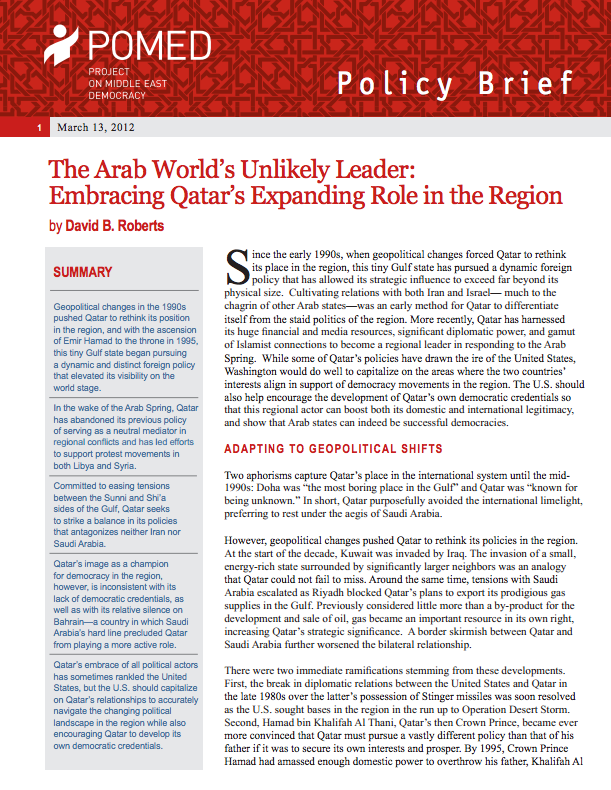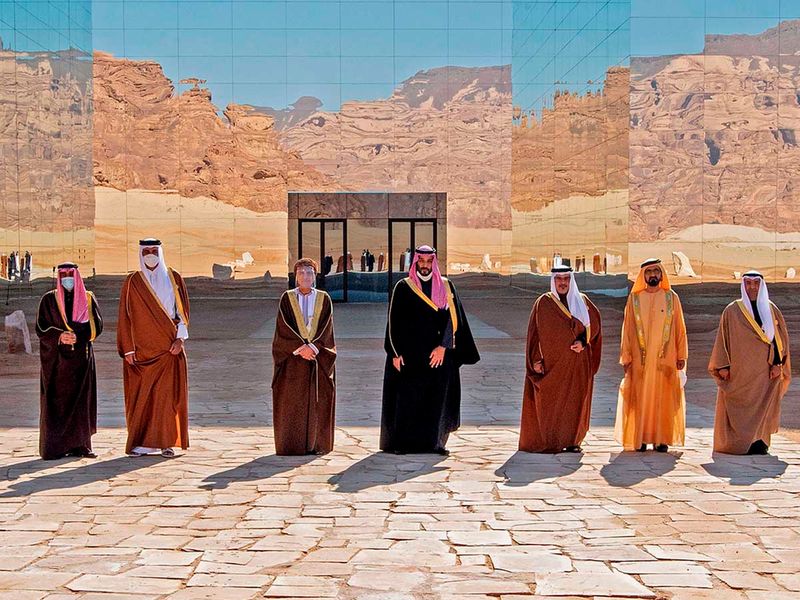For a full text copy of the brief, click here.
Since the early 1990s, when geopolitical changes forced Qatar to rethink its place in the region, this tiny Gulf state has pursued a dynamic foreign policy that has allowed its strategic influence to exceed far beyond its physical size. Cultivating relations with both Iran and Israel—much to the chagrin of other Arab states—was an early method for Qatar to differentiate itself from the staid politics of the region.  More recently, Qatar has harnessed its huge financial and media resources, significant diplomatic power, and gamut of Islamist connections to become a regional leader in responding to the Arab Spring. While some of Qatar’s policies have drawn the ire of the United States, Washington would do well to capitalize on the areas where the two countries’ interests align in support of democracy movements in the region. The U.S. should also help encourage the development of Qatar’s own democratic credentials so that this regional actor can boost both its domestic and international legitimacy, and show that Arab states can indeed be successful democracies.
More recently, Qatar has harnessed its huge financial and media resources, significant diplomatic power, and gamut of Islamist connections to become a regional leader in responding to the Arab Spring. While some of Qatar’s policies have drawn the ire of the United States, Washington would do well to capitalize on the areas where the two countries’ interests align in support of democracy movements in the region. The U.S. should also help encourage the development of Qatar’s own democratic credentials so that this regional actor can boost both its domestic and international legitimacy, and show that Arab states can indeed be successful democracies.
Policy Recommendations
- Capitalize on Qatar’s relationships with a wide spectrum of actors to accurately map the contours of the Arab Spring political fallout and engage in dialogue with these new loci of power. It is becoming ever clearer that Qatar is singularly fashioning a place for itself as a mediator between a number of Islamist groups (Hamas, the Taliban, various Libyan factions, etc.) and Western countries.
- Encourage the elite in Doha to pursue a more multilateral approach to addressing international problems. Qatar has made a name for itself as an independent actor with a dynamic, distinct foreign policy.
- Encourage Qatar to stick to its promise of holding parliamentary elections in 2013. While parliamentary elections themselves will not bring about significant changes in Qatar, they can serve as an opportunity for discussion about further democratic reforms.
- Further explore with Qatar’s elite the possibility of hosting the 5th Fleet in Qatar, given Bahrain’s deteriorating security situation. Unrest in Bahrain continues unabated and could escalate to the point that the U.S. may be forced to reconsider Manama as the location for the 5th Fleet. Qatar offers one of the few viable options for relocating the 5th Fleet within the region, even if only on a temporary basis.
- Pressure and support Qatar to improve its record in human trafficking as it has remained on the U.S. State Department’s ‘Tier 2WatchList’ for three years. Despite promising rhetoric and the passage of select human trafficking laws, Qatar has not taken meaningful action on this issue.
- Push the elite in Qatar (and Israel) to re-establish an Israeli trade office in Doha. Reportedly, Qatar is willing to reopen the Israeli trade office in Doha after suspending diplomatic ties with Israel in the wake of the 2009 Israeli offensive on Gaza.
Please click here to sign-up to receive e-mail updates from POMED.




|
‘The Smartphones are Listening’: Regulating Exports and Abuses of Cybertools in the MENA Region